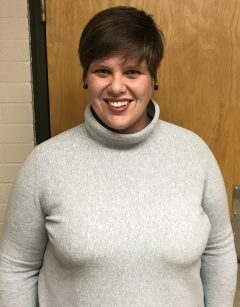 Sabrina Peric (Department of Anthropology and Archaeology, University of Calgary) is a visiting scholar at Carleton University from the University of Calgary. Her visit on March 21 and 22, 2019 focused on issues related to the anthropology of climate change, her research, and ways to integrate climate change into teaching. When discussing the goals of the talk and her work, Peric described it as an opportunity to “get together with faculty and students to talk about how we can teach climate change since it is not only a newer pedagogical topic, but something that’s garnering more demand from students and faculty.” Her discussion focused on the opportunities and challenges that the topic of climate change and decolonization in Canada presents today. “Specifically, the way that land has been treated in a colonial context,” she says, “and, what it means to move out of that colonial context, whether it’s possible, and what possibilities there are of building new relationships with our indigenous neighbors, including what role this can play in action against climate change.”
Sabrina Peric (Department of Anthropology and Archaeology, University of Calgary) is a visiting scholar at Carleton University from the University of Calgary. Her visit on March 21 and 22, 2019 focused on issues related to the anthropology of climate change, her research, and ways to integrate climate change into teaching. When discussing the goals of the talk and her work, Peric described it as an opportunity to “get together with faculty and students to talk about how we can teach climate change since it is not only a newer pedagogical topic, but something that’s garnering more demand from students and faculty.” Her discussion focused on the opportunities and challenges that the topic of climate change and decolonization in Canada presents today. “Specifically, the way that land has been treated in a colonial context,” she says, “and, what it means to move out of that colonial context, whether it’s possible, and what possibilities there are of building new relationships with our indigenous neighbors, including what role this can play in action against climate change.”
Discussing how social inequalities influence the ways climate change is addressed, Peric stresses the huge implications they have. For her, it’s the basis of understanding how energy systems affect people on a daily basis and how energy is impacting us. Within Canada, the issue of decolonization and “understanding Canada as a settler state that has exploited many of the resources across the country” are essential in addressing the central issues of climate change. Due to the difference in lived experience and how climate change is addressed, she mentions research into energy and climate change should focus on the local level as opposed to the national level. Peric believes energy stories from individuals, their own narratives, are “powerful and very revelatory” as energy infrastructure are unequal, and not everyone has an equal voice in deciding how to move forward with energy in the future. “I think that precisely by focusing on people’s individual energy stories we can get to the roots of some of these bigger questions.” Peric, as a scholar, feels a responsibility to engage with communities across the country on these broader discussions of energy and climate change considering the current climate (i.e. questions surrounding the Trans Mountain pipeline and climate change). For her, addressing the issues of reformulating relationships to the land means addressing the broader decolonization process, acknowledging that it is still ongoing, and it has been affecting indigenous people for many centuries – and, equally critically, the environment. Peric views humanities and social sciences as playing a critical role in understanding and reformulating this relationship: “I don’t think our roots to solving climate change are technological, I think they are deeply social, and … deeply political”.
The Energy In Society (E I S) research group was formulated specifically to recognize energy transition as a social and political problem. Peric formed this group with her colleagues Dr. Petra Dolata, in history, and Dr. Roberta Rice, in political science, at the University of Calgary. They are interested in creating at the University of Calgary a community of energy scholars – people who look at broader issues of energy at the University of Calgary –, to work on new research collaborations. The University of Calgary is generally seen as a university that does a lot of energy research on the natural sciences. Peric and her colleagues were aware of humanities and social sciences scholars who were doing work on the question of energy futures and transitions but had no forum within which to get together. The E I S research group was created to bring these people together. Over the past couple of years, they’ve been working on collaborative research projects, have run speaker’s series, and public events for the broader Calgary community to bring recognition to the real social effects that energy has on our daily lives. Peric, Dolata, and Rice are interested in these broader issues of science and governance as energy has a very daily, tangible effect on people’s lives. “Generally, there has been a great burden – and also opportunity – put on the natural sciences to be some technological fix … [but] we recognize that there is a massive role for the humanities and social sciences to play here.”
Interview Conducted by Anne Cynthia Kazora
(Human Rights and Carleton Climate Commons practicum student, Carleton University)
Below are a few recommended readings by Dr. Sabrina Peric:
Coulthard, G. S., 1974 (2014). Red skin, white masks: Rejecting the colonial politics of recognition. Minneapolis: University of Minnesota Press.
Cruikshank, J. (2005). Do glaciers listen?: Local knowledge, colonial encounters, and social imagination. Vancouver: UBC Press.
Hooks, B. (1994). Teaching to transgress: Education as the practice of freedom. New York: Routledge.